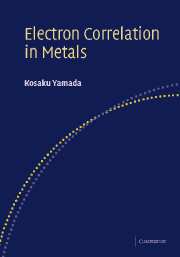Book contents
- Frontmatter
- Contents
- Preface
- 1 Fermi gas
- 2 Fermi liquid theory
- 3 Anderson's orthogonality theorem
- 4 s–d Hamiltonian and Kondo effect
- 5 Anderson Hamiltonian
- 6 Hubbard Hamiltonian
- 7 Fermi liquid theory of strongly correlated electron systems
- 8 Transport theory based on Fermi liquid theory
- 9 Superconductivity in strongly correlated electron systems
- Appendix A Feynman relation
- Appendix B Second quantization
- Appendix C Interaction representation and thermal Green's function
- Appendix D Linear response theory
- Appendix E Transport equation derived by Éliashberg
- Index
2 - Fermi liquid theory
Published online by Cambridge University Press: 23 December 2009
- Frontmatter
- Contents
- Preface
- 1 Fermi gas
- 2 Fermi liquid theory
- 3 Anderson's orthogonality theorem
- 4 s–d Hamiltonian and Kondo effect
- 5 Anderson Hamiltonian
- 6 Hubbard Hamiltonian
- 7 Fermi liquid theory of strongly correlated electron systems
- 8 Transport theory based on Fermi liquid theory
- 9 Superconductivity in strongly correlated electron systems
- Appendix A Feynman relation
- Appendix B Second quantization
- Appendix C Interaction representation and thermal Green's function
- Appendix D Linear response theory
- Appendix E Transport equation derived by Éliashberg
- Index
Summary
We will consider the normal state of interacting Fermi particles without any longrange order. The normal state at low temperatures is called the Fermi liquid and is considered to be the system of free quasi-particles that is continuously connected with free Fermi gas. The concept of the Fermi liquid was introduced and developed by L. D. Landau. Landau's Fermi liquid theory, which concentrates rich contents into a simple theory, is a good example to solve many-body problems. In this chapter, we introduce the basis and main contents of the Fermi liquid.
Principle of continuity
The basis of the Fermi liquid theory is the principle of adiabatic continuity, which connects free Fermi gas with the Fermi liquid by introducing gradually an interaction among particles. There is a one-to-one correspondence between two states before and after the introduction of the interaction. States belonging to the same symmetry do not cross each other, and new states with the interaction can be represented by the old quantum number. Since the distribution of free Fermi gas is given by the Fermi distribution function n(k), that of the Fermi liquid is also written n(k). The state denoted by k, σ in the Fermi liquid is called the quasi-particle. For the system to be described by quasi-particles, the following condition is necessary.
Let us consider the basis of the Fermi liquid theory following the explanation of the Landau theory given by Nozières and Anderson.
- Type
- Chapter
- Information
- Electron Correlation in Metals , pp. 22 - 28Publisher: Cambridge University PressPrint publication year: 2004

